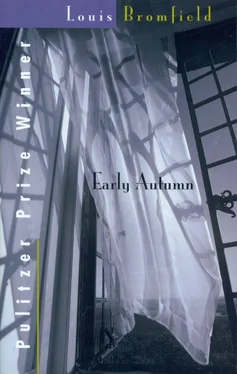And Olivia felt a sudden, swift, almost poignant wave of affection for the abrupt, grim woman, an affection which it was impossible to express because Sabine was too scornful of all sentiment and too shut in ever to receive gracefully a demonstration; yet she fancied that Sabine knew she was fond of her, in the same shy, silent way that old John Pentland knew she was fond of him. It was impossible for either of them ever to speak of such simple things as affection.
Since Sabine had come to Durham, it seemed to Olivia that life was a little less barren and not quite so hopeless. There was in Sabine a curious hard, solid strength which the others, save only the old man, lacked completely. Sabine had made some discovery in life that had set her free … of everything but that terrible barrier of false coldness.
In the midst of these thoughts came another procession of retreating guests, and the sadness, slipping away from Olivia’s face, gave way to a perfect, artificial sort of gaiety. She smiled, she murmured, “Good-night, must you go,” and, “Good-night, I’m so glad that you liked the ball.” She was arch with silly old men and kind to the shy young ones and repeated the same phrases over and over again monotonously. People went away saying, “What a charming woman Olivia Pentland is!”
Yet immediately afterward she did not remember who had passed by her.
One by one the guests departed, and presently the black musicians packed up their instruments and went away, and at last Sybil appeared, shy and dark, looking a little pale and tired in her clinging gown of pale green. At sight of her daughter a little thrill of pride ran through Olivia. She was the loveliest of all the girls at the ball, not the most flamboyant, but the gentlest and really the most beautiful. She possessed the same slow beauty of her mother, which enveloped one in a kind of mist that lingered long after she herself had gone away. She was neither loud and mannish and vulgar like the “horsey” women nor common like the girls who used too much paint and tried to behave like women of the world. There was already about her the timelessness that envelops a lady no matter the generation in which she appears; there was a mystery, a sophistication and knowledge of life which put to rout all the cheap flashiness of the others. And yet, somehow, that same cool, shy poise and beauty frightened people. Boys who were used to calling young girls “Good old So-and-so” found themselves helpless before the dignity of a young girl who looked in her green gown a little like a cool wood nymph. It troubled Olivia profoundly, not for herself, but because she wanted the girl to be happy—more than that, to know the depths of happiness which she herself had sensed but never found. It was in a way as if she saw herself again in Sybil, as if looking back now from the pinnacle of her own experience she could guide this younger self, standing on the brink of life, along paths less barren than those trod by her own feet. It was so necessary that Sybil should fall in love with a man who would make her happy. With most girls it would make little difference one way or another, so long as they had money; if they were unhappy or bored they would divorce their husbands and try again because that was the rule in their world. But with Sybil, marriage would be either an immense, incalculable happiness or a profound and hopeless tragedy.
She thought suddenly of what Sabine had said of Thérèse a little while before. “I was wrong about coming back here. I’ll never marry her off in this part of the world.”
It was true somehow of Sybil. The girl, in some mysterious fashion, knew what it was she wanted; and this was not a life which was safe and assured, running smoothly in a rigid groove fixed by tradition and circumstance. It was not marriage with a man who was like all the other men in his world. It went deeper than all that. She wanted somehow to get far down beneath the surface of that life all about her, deep down where there was a savor to all she did. It was a hunger which Olivia understood well enough.
The girl approached her mother and, slipping her arm about her waist, stood there, looking for all the world like Olivia’s sister.
“Have you enjoyed it?” asked Olivia.
“Yes. … It’s been fun.”
Olivia smiled. “But not too much?”
“No, not too much.” Sybil laughed abruptly, as if some humorous memory had suddenly come to life.
“Thérèse ran away,” said her mother.
“I know … she told me she was going to.”
“She didn’t like it.”
“No … she thought the boys stupid.”
“They’re very much like all boys of their age. It’s not an interesting time.”
Sybil frowned a little. “Thérèse doesn’t think so. She says all they have to talk about is their clubs and drinking … neither subject is of very much interest.”
“They might have been, if you’d lived here always … like the other girls. You and Thérèse see it from the outside.” The girl didn’t answer, and Olivia asked: “You don’t think I was wrong in sending you to France to school?”
Quickly Sybil looked up. “Oh, no … no,” she said, and then added with smoldering eagerness, “I wouldn’t have changed it for anything in the world.”
“I thought you might enjoy life more if you saw a little more than one corner of it. … I wanted you to be away from here for a little time.” (She did not say what she thought—“Because I wanted you to escape the blight that touches everything at Pentlands.”)
“I’m glad,” the girl replied. “I’m glad because it makes everything different. … I can’t explain it. … Only as if everything had more meaning than it would have otherwise.”
Suddenly Olivia kissed her daughter and said: “You’re a clever girl; things aren’t wasted on you. And now go along to bed. I’ll stop in to say good-night.”
She watched the girl as she moved away through the big empty hall past the long procession of Pentland family portraits, thinking all the while that beside them Sybil seemed so fresh and full of warm eager life; and when at last she turned, she encountered her father-in-law and old Mrs. Soames moving along the narrow passage that led from the writing room. It struck her sharply that the gaunt, handsome old John Pentland seemed really old tonight, in a way he had never been before, old and a little bent, with purplish circles under his bright black eyes.
Old Mrs. Soames, with her funny, intricate, dyed-black coiffure and rouged cheeks and sagging chin supported by a collar of pearls, leaned on his arm—the wreck of a handsome woman who had fallen back upon such silly, obvious tricks as rouge and dye—a vain, tragic old woman who never knew that she was a figure of fun. At sight of her, there rose in Olivia’s mind a whole vista of memories—assembly after assembly with Mrs. Soames in stomacher and tiara standing in the reception line bowing and smirking over rites that had survived in a provincial fashion some darker, more barbaric, social age.
And the sight of the old man walking gently and slowly, out of deference to Mrs. Soames’ infirmities, filled Olivia with a sudden desire to weep.
John Pentland said, “I’m going to drive over with Mrs. Soames, Olivia dear. You can leave the door open for me.” And giving his daughter-in-law a quick look of affection he led Mrs. Soames away across the terrace to his motorcar.
It was only after they had gone that Olivia discovered Sabine standing in the corridor in her brilliant green dress watching the two old people from the shadow of one of the deep-set windows. For a moment, absorbed in the sight of John Pentland helping Mrs. Soames with a grim courtliness into the motorcar, neither of them spoke, but as the motorcar drove away down the long drive under the moon-silvered elms, Sabine sighed and said, “I can remember her as a great beauty … a really great beauty. There aren’t any more like her, who make their beauty a profession. I used to see her when I was a little girl. She was beautiful—like Diana in the hunting field. They’ve been like that for … for how long. … It must be forty years, I suppose.”
Читать дальше












